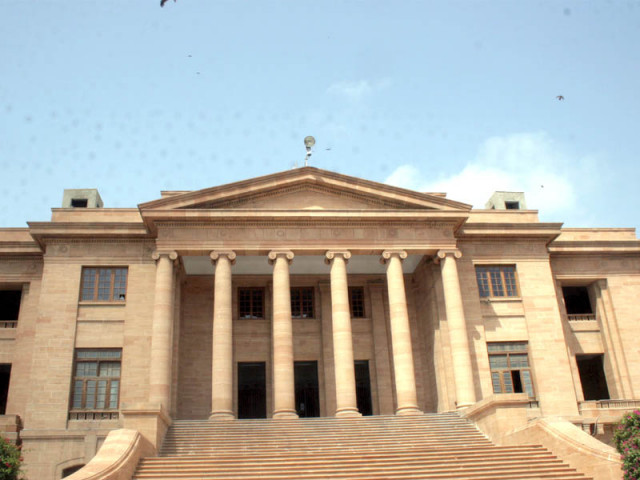SHC issues notices to chief minister, chief secretary and assembly speaker
Petitioner argues that newly passed bill is contrary to spirit of the Constitution

Sindh High Court. PHOTO: EXPRESS
A two-judge bench, headed by Justice Aqeel Ahmed Abbasi, also issued notices to the provincial advocate-general to submit comments on behalf of the provincial authorities by March 29.
A civil rights group, Pasban-e-Pakistan, had challenged the bill in the SHC and pleaded to the court to declare it illegal and unconstitutional.
Naming the CM, speaker and chief secretary as respondents in the plea, the party's president, Altaf Shakoor, argued that the bill was like dacoity at the 24 universities of the province as it robbed them of their essential authority.
University teachers reject amendments in Sindh University Laws Act
The petitioner argued that the respondents had miserably failed to fulfil their constitutional duties to provide free education, health and homes to citizens. Due to the respondents' failure, private sector educational institutes grew like cancer in society, which charged exorbitant monthly amounts from poor people of the province, Shakoor added.
He argued that the controversial bill was passed by the assembly on Friday, March 9, when the quorum was incomplete as only 28 MPAs were present in the House.
Shakoor highlighted that the bill made significant changes in the varsities' syndicates and if the bill was enacted, vice-chancellors (VC) could not take administrative decisions to run the day to day affairs of the varisities. The petitioner added that even appointments made by the VCs were subject to the approval of the CM and bureaucrats.
He argued that the controversial bill had snatched the autonomy enjoyed by the higher education institutions as it inducted bureaucrats in their syndicate after which they would be run according to the whims and desires of the bureaucracy.
The autonomy given to the universities through the University Act, 1973, had been curbed illegally, the petitioner argued. He added that bureaucrats and political representatives who have no knowledge or expertise to run higher education institutions would be making the administrative decisions of the varsities, which would ultimately destroy their educational structure.
"All the daily [newspapers] and editorials, and teachers and professors all over the province have agitated [against] and condemned the controversial bill," the petitioner's lawyer argued.
University teachers reject amendments in Sindh University Laws Act
The SHC was informed that the provincial assembly had failed to appreciate articles 2-A, 3, 4, 7, 8, 22 and 25 and the complete Chapter 2 of the Constitution while passing the impugned bill. "The legislation is illegal, unconstitutional, void ab initio, of no legal effect, against the principle of natural justice and also against the provisions of the General Clause Act and inconsistent with the spirit of the Constitution," the petitioner argued.
Shakoor claimed that the provincial assembly had no lawful power or authority to pass such a bill with incomplete quorum and without fulfilling the lawful and constitutional formalities. "The intentions, aims and objectivess of the legislature should always be bona fide and in the welfare and interest of the general public," the petitioner argued.
The SHC was pleaded to declare the bill as unconstitutional and void ab initio. The court was also pleaded to restrain the respondents, their subordinates and anyone else from acting according to the bill till the final disposal of the matter.



















COMMENTS
Comments are moderated and generally will be posted if they are on-topic and not abusive.
For more information, please see our Comments FAQ